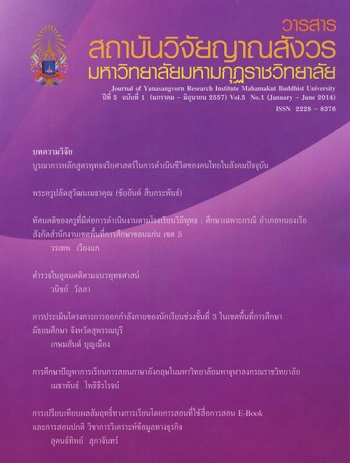THE IDEAL POLICE IN BUDDHIST PERSPECTIVES
Main Article Content
Abstract
The objectives of this thesis were as follows; 1) to study the history and duty of Thai Police, 2) to study the ideal police in Thai society, 3) to study the ideal police in Buddhist perspectives, and 4) to present a new knowledge in term of a research model of “the ideal police in Buddhist perspectives”. The research methodology was the documentary qualitative research in which data were collected from the primary sources, Tipitaka and the secondary sources, relevant texts and other research works. It was also collected from in-depth interview data. There were 9 key informants of interviewees divided into two groups; 5 police scholars and 4 Buddhist scholars. All collected data were descriptively analyzed and synthesized to be a model. The results of research were found as follows : Police was a state bureaucrat. Historically, police was a man who help the king to control and govern the kingdom for peaceful living of the citizen. In Thailand, the police was unofficial found from the reign of the Sukhothai kingdom, but it could not show the official rank of police. It obviously found the official rank of police in the reign of Ayudhya kingdom. In the reign of Ratnakosintra kingdom, the police school was officially established by king Rama the 4th and king Rama the 5th respectively. Nowadays polices have to do their duties on survey for peaceful living, investigating, questioning, arresting, and suppressing those who do wrong. Polices have to enforce the law and prevent the chaos in the society. The ideal police in Thai society was on the basic of those who practice according to the police’s ethics and morality. Polices do not biasedly do, must do based on the people interest, and do not do cruelly to the people. Police must do according to the King’s instruction of 4 Dhammas, and also do according to the state bureaucratic ethics and the police’s declaration. The ideal Police in Buddhist perspectives was the one who practiced according to 4 dimensions of Dhamma, i.e., basic individual Dhamma of humanity, do not violate other people on physical body, things, lovers, agreements and do not harm oneself by drinking intoxicating liquor. Polices do not live heedfulness, and do live with endeavor. The second Dhamma was the family dimension. Polices must be respect and grateful to the parents, and take care of family to be happy. The third was the social dimension. Polices must be respect, humble and polite to respected people in society. Polices must do their duties with understanding, without wrong emotion. At last dimension of Dhamma for Commander, polices must be respectful to themselves and other police ranks, particularly to the higher ranks. It could be synthesized as the body of knowledge that “if the police was of the morality, doing duty for peaceful society, keeping justice without bias and always developing oneself, then the police was the ideal in Buddhist perspectives or called MDD Model.
Article Details
References
กรมตำรวจ.การควบคุมอาชญากรรมจากสภาพแวดล้อม: หลักทฤษฎีและมาตรการประชาชนและความสงบสุขของสังคม. กรุงเทพมหานคร : โรงพิมพ์กรมตำรวจ,2531.
“พ.ร.บ. ว่าด้วยวินัยตำรวจ พ.ศ. 2477 มาตรา ๘,9”และระเบียบของสำนักงานตำรวจแห่งชาติว่าด้วยจรรยาบรรณของพนักงานสอบสวน พ.ศ.2544”.
พ.ร.บ.ตำรวจแห่งชาติ พ.ศ.2547.“แผนพัฒนาสำนักงานตำรวจแห่งชาติ พ.ศ. 2550 – 2554.
ประสพโชค พินิจศักดิ์.“การยอมรับในการส่งเสริมจริยธรรมของเจ้าพนักงานตำรวจท้องที่ในการบัญชาการตำรวจนครบาล”.วิทยานิพนธ์สังคมศาสตรมหาบัณฑิต. บัณฑิตวิทยาลัย : มหาวิทยาลัยมหิดล, 2530.
สถาพร หลาวทอง, พล.ต.ท. “โครงการตำรวจยิ้ม โดยอัญเชิญพระราชดำรัสของพระบาทสมเด็จพระเจ้าอยู่หัว มาเป็นบรรทัดฐานในการทำงาน เน้นเข้าใจ เข้าถึง พัฒนา”. ตำรวจไทย,(20 กุมภาพันธ์2549).
ศูนย์ส่งเสริมและพัฒนาพลังแผ่นดินเชิงคุณธรรม. “เปิดขอบฟ้า คุณธรรม จริยธรรม”. 3 มกราคม 2555,


